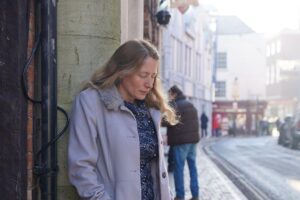- House of Commons vote 116-299 to criminalise all forms of “influence” near abortion facilities across England and Wales
- Amendments to protect silent prayer and consensual conversations fail to gain support
WESTMINSTER, LONDON (7th March 2023) – Members of Parliament have approved the introduction of censorship zones (also known as “buffer zones”) outside of abortion facilities across England and Wales.
Clause 11 (formerly Clause 9 then Clause 10) of the Public Order Bill could criminalise any form of “influence” outside of abortion facilities – including in the form of silent prayer.
An amendment to permit silent prayer and consensual conversations within the censorship zones was proposed by Andrew Lewer MP, but failed to pass after a vote of 116 to 299.
“Today’s vote marks a watershed moment for fundamental rights and freedoms in our country. Parliament had an opportunity to reject the criminalisation of free thought, which is an absolute right, and embrace individual liberty for all. Instead, Parliament chose to endorse censorship and criminalise peaceful activities such as silent prayer and consensual conversation,” said Jeremiah Igunnubole, Legal Counsel for ADF UK, the legal organisation working to promote fundamental freedoms.
“Today it’s abortion. Tomorrow it could be another contested matter of political debate. The principle remains that the government should never be able to punish anyone for prayer, let alone silent prayer, and peaceful and consensual conversation. Thankfully, where the clause initially called for a prison sentence for those convicted of engaging in these peaceful activities near abortion facilities, the penalty now has been reduced to a fine. Nevertheless, it is extremely regrettable that Parliament, which exists to protect and champion the rights of the electorate, has taken a clear stance against fundamental freedoms, opening the door for nationwide thought-crime prosecution,” he continued.
Concerns about criminalising thought
The vote comes despite the most recent government review (2018) finding that censorship zones would be an unnecessary and “disproportionate” restriction on rights, given that harassment is already criminalised under existing legislation, and instances of harassment outside abortion facilities were found to be “rare”.
Most frequently, according to the review, volunteers pray, or offer leaflets about help services available to women who would be interested in alternatives to abortion.
According to BBC polling last year, almost 1 in 5 women who have abortions do so against their will.
Arrests for Silently Praying
The move comes the day after news that charitable volunteer Isabel Vaughan-Spruce was arrested for the second time for praying silently, in her mind, near an abortion facility in Birmingham, where local authorities have implemented a “buffer zone” via a Public Spaces Protection Order.
The arrest, which was attended by six police officers, comes only weeks after Ms. Vaughan-Spruce was found “not guilty” for the same activity by the Birmingham Magistrates’ Court. She had been criminally charged in December on the basis that her silent, imperceptible prayers amounted to “intimidation”.
The prosecution were not able to present any evidence to the court to substantiate the “thought-crime”, and Ms. Vaughan-Spruce’s name was cleared, along with Father Sean Gough, who was similarly charged and acquitted.
“Only three weeks ago, the Court made clear that my silent prayers were not a crime. And yet, again, I have been arrested and treated like a criminal for having the exact same thoughts in my head, in the same location. The ambiguity of laws that limit free expression and thought – even in peaceful, consensual conversation or in silent, internal prayer – leads to abject confusion, to the detriment of our essential fundamental rights. Nobody should be criminalised for their thoughts,” said Isabel Vaughan-Spruce.
“Parliament’s introduction of censorship zones across the country today will mean that many more innocent people like Isabel Vaughan-Spruce will be unjustly criminalised for their silent thoughts, or for peacefully offering leaflets about charitable help available to women who might want to hear about other options. In the name of choice, these zones actually eliminate the options available to women. A free society should never prohibit the peaceful exchange of information,” commented Igunnubole.
MPs raise concerns
Speaking in Parliament, Conservative MP Andrew Lewer (Northampton South) backed his proposed amendment to protect silent prayer and consensual conversation. He condemned harassment against women in every circumstance, but made clear that such actions are “a world away” from the police being able to detain people and question them for praying silently.
“Police shouldn’t be asking ‘What are you thinking about?!’”, said Lewer.
“Censorship of this sort is a notoriously slippery slope. It might not be your thoughts that are criminalised today, but I think we should all be careful not to open the door to that tomorrow about some other opinions that people may hold about something else,” the MP continued.
Sir John Hayes, Member for South Holland and The Deepings, emphasised that this amendment should not be seen as an opportunity to debate abortion, but was a matter of protecting free speech. “This is about freedom – it’s not about the purpose of freedom or the location of it. It’s about the ability to think, and speak, and pray freely,” he explained.
Danny Kruger, MP for Devizes in Wiltshire, cautioned other Members that “we are making a momentous step, we are crossing an enormous river. When we criminalise prayer… or indeed consensual conversations… we are doing something of enormous significance.” He ended his remarks with the question, “what are we doing, by saying that people should not be allowed to pray, quietly, on their own?”.
Nick Fletcher, MP for Don Valley, reminded the chamber that women “might actually want somebody to turn to… And if somebody is being coerced… to have a forced abortion, that [volunteer] could be somebody… who is actually there to help.”
Sir Edward Leigh, MP for Gainsborough, expressed his views on Isabel Vaughan-Spruce’s arrest before making a comparison with George Orwell’s 1984:“There was nothing [Isabel Vaughan-Spruce] was obviously doing which was harassment or in any way objectionable. The police officer had to actually go into her mind… this is what surely is quite dangerous.”


